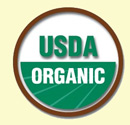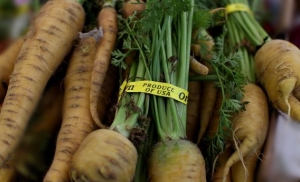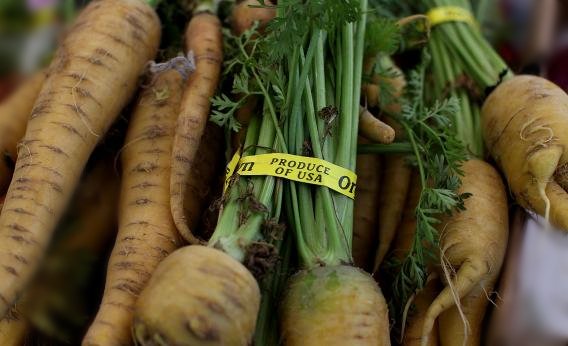
Recently there’s been some media specualtion about whether Organic foods are actually better for us than Non Organic foods.
According to the New York Times, scientists at Stanford Research have combed through 40 years of research comparing Organic vs. non Organic foods, and found that those labeled Organic have the same nutritional value as their non Organic counterparts. I’d love to know how many hundreds of thousands of dollars were spent on this research study to determine that an organic orange has the same nutritional value as a non Organic orange.
While I’m not a Stanford research scientist, I know enough to know that an orange is an orange is an orange. Right? So to say that we held a study to determine whether nutritional value content differs among fruits and veggies based on pesticide use (non Organic farming) is a bit ridiculous. It seems the better use of research funds is to explore the damage we are enduring from the rampant use of pesticides in our foods, and the effects of genetically modified organisms which are found in most of our processed foods here in America, as well as in the veggies and legumes on our dinner tables. And unless we raise enough fuss to fight it, it seems like we are heading down the road of further Genetically Modified foods, including fruits such as apples and oranges.
So why are Organic foods so expensive?
Many of you may not be aware that the government offers taxpayer-funded resources called subsidies to the farmers using genetically engineered seeds and who are saturating crops with insecticides and weed killers, while charging the organic farmers fees to prove that their crops are safe. As Robin O’Brien points out, that’s like being charged to wear your seatbelt.
And this fight has been enduring since 1990, when the Organic Foods Production Act (OFPA), as part of the 1990 Farm Bill, was passed, and established a set of standards for Organic food handling. These new standards include a national list of approved synthetic and prohibited non-synthetic substances for organic production, which means that organically produced foods also must be produced without the use of:
- antibiotics
- artificial growth hormones
- high fructose corn syrup
- artificial dyes (made from coal tar and petrochemicals)
- artificial sweeteners derived from chemicals
- synthetically created chemical pesticide and fertilizers
- genetically engineered proteins and ingredients
- sewage sludge
- irradiation
Conventional vs. organic farming

SAN FRANCISCO, CA – JUNE 13, (Photo by Justin Sullivan/Getty Images)
Photo by Justin Sullivan/Getty Images
The word “organic” refers to the way farmers grow and process agricultural products, such as fruits, vegetables, grains, dairy products and meat. Organic farming practices are designed to encourage soil and water conservation and reduce pollution. Farmers who grow organic produce and meat don’t use conventional methods to fertilize, control weeds or prevent livestock disease. For example, rather than using chemical weed killers, organic farmers may conduct more advanced crop rotations and spread mulch or manure to keep weeds at bay.
Here are some key differences between conventional farming and organic farming:
| Conventional | Organic |
|---|---|
| Apply chemical fertilizers to promote plant growth. | Apply natural fertilizers, such as manure or compost, to feed soil and plants. |
| Spray synthetic insecticides to reduce pests and disease. | Spray pesticides from natural sources; use beneficial insects and birds, mating disruption or traps to reduce pests and disease. |
| Use synthetic herbicides to manage weeds. | Use environmentally-generated plant-killing compounds; rotate crops, till, hand weed or mulch to manage weeds. |
| Give animals antibiotics, growth hormones and medications to prevent disease and spur growth. | Give animals organic feed and allow them access to the outdoors. Use preventive measures — such as rotational grazing, a balanced diet and clean housing — to help minimize disease. |
So what can you do to protect your family?
- Alteya
- Amrita
- Aromafloria
- Aubrey
- Baby Bear Shop
- Badger
- Beeceuticals
- Bentley Organic
- Buddah Nose
- Bubble and Bee Organic
- Dr. Bronner’s Magic Soaps
- Earth Mama and Angel Baby
- Eco Lips
- Eminence
- EO
- Erbaorganics
- Erbaviva
- Indian Meadow Herbals
- Intelligent Nutrients
- Juice Beauty
- Kimberly Perry
- Lafe’s
- Mercola
- Merry Hempsters
- Miessence Certified Organic
- Motherlove
- Nature’s Baby
- Nature’s Paradise
- Noli n Nali
- OGmama and OGbaby
- Organicare
- Organic Blessings
- Organic Essence
- Organoderm
- Origins
- Purely Shea
- Rainwater
- Revolution
- Rose Tattoo Aftercare
- Seasons of the Soul
- Sensibility Soaps
- Simply Organic
- SoCal Cleanse
- Terressentials
- Trillium Organics
- Vermont Soap

